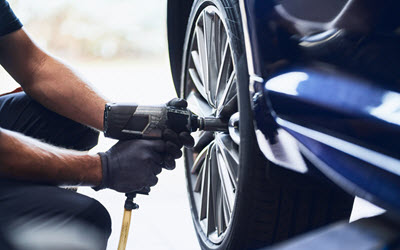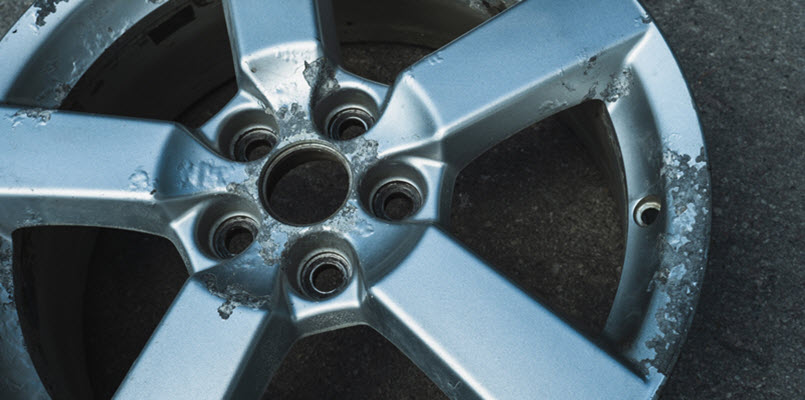BMW is a luxury car brand with a reputation for producing high-performance vehicles with smooth rides and sleek designs. One of the standout features of BMW cars is their alloy wheels, crafted to provide aesthetic appeal and performance. However, despite their durability, these wheels can still be prone to cracking, which can be a major safety concern, not to mention that it looks bad.
A cracked alloy wheel can cause a loss of tire pressure, vibration, and even lead to a blowout while driving. This can put the driver and passengers in danger and cause costly damage to your BMW. With this in mind, it is crucial for all BMW owners to understand the causes of cracked alloy wheels, how to identify them, and the preventative measures that can be taken. Additionally, knowing how to repair or replace a cracked wheel is equally important to prevent further damage and ensure the vehicle’s safe operation. By being proactive in maintaining alloy wheels, BMW drivers can continue to enjoy the performance and style that these cars are designed for.
The Usual Causes of Cracked Alloy Wheels
- Potholes and Curb Damage: Potholes and curbs are the most common causes of cracked alloy wheels. The impact of hitting a pothole or curb can cause a crack in the wheel.
- Overloading your BMW: Overloading the vehicle with excess weight can put pressure on the wheels, which can cause them to crack.
- Corrosion: Corrosion can take place when alloy wheels are exposed to the elements, like rain and moisture, for a long time. This corrosion can weaken the alloy wheel, making it more susceptible to cracking.
- Stress from Hard Driving: Hard driving, such as rapid acceleration or sudden stops, can cause stress on the alloy wheels. This may lead to cracking over time. This is why it is important to check your alloy wheels often, ensuring that your driving pleasure is not taking a toll on your BMW.
Signs of Cracked Alloy Wheels
Here are signs that your alloy wheels are becoming faulty:
- Visible Cracks: The most obvious sign of a cracked alloy wheel is visible cracks. These can range from just hairline cracks to larger and more visible cracks.
- Loss of Air Pressure: If you notice that your tire is consistently losing air pressure, it may be due to a crack in the alloy wheel.
- Vibration: A cracked alloy wheel can cause a noticeable vibration in the steering wheel or the vehicle itself.
How to Mitigate Cracked Alloy Wheels in Your BMW
- Avoid Potholes and Curb Damage: Avoiding potholes and hitting curbs is one of the best ways to prevent cracked alloy wheels, not to mention suspension problems. Be aware of the road conditions and try to avoid driving quickly over large potholes, and drive slowly so you don’t clip any curbs in drive-thrus or at banking ATMs, etc.
- Regular Maintenance: Regular maintenance of your vehicle can help prevent cracks from forming on the wheels. This includes checking the tire pressure, rotating the tires, and inspecting the wheels for any signs of damage.
- Avoid Overloading your BMW: Try not to carry excess weight when you tow, as this can put pressure on the wheels and cause them to crack.
Get Expert BMW Help From Master Mechanics Auto Repair
If you’re a BMW driver in Battle Creek, Portage, Kalamazoo, MI, and you’re experiencing issues with your alloy wheels,  it’s important to have them checked out by a professional mechanic as soon as possible. We are committed to providing our clients with reliable and efficient repair services. Our team of experienced mechanics has the expertise and knowledge needed to diagnose and repair any issues with your vehicle’s wheels.
it’s important to have them checked out by a professional mechanic as soon as possible. We are committed to providing our clients with reliable and efficient repair services. Our team of experienced mechanics has the expertise and knowledge needed to diagnose and repair any issues with your vehicle’s wheels.
We understand how crucial it is to have a safe and reliable vehicle, so we use only high-quality materials and the latest technology to ensure your vehicle is running smoothly. Whether you need a simple repair or a full replacement of your alloy wheels, you can count on us to complete the job. If you need alloy wheel repair services in Battle Creek, Portage, Kalamazoo, MI, give us a call at Master Mechanics Auto Repair today to book an appointment with our experts!



